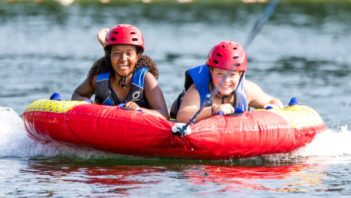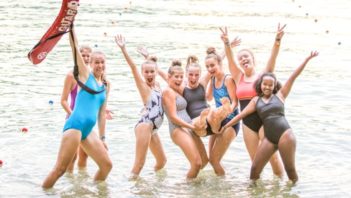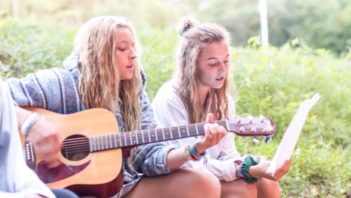Deer Run Staff FAQs
What is the difference between Camp Brookwoods and Camp Deer Run?
What does it mean to be a Christian camp?
Do I need to be a Christian?
How old do have to be to work at camp?
How is camp organized?
What kinds of jobs are available at camp?
See the “Staff Positions” page for details.
- Counselors
- Program Staff and Specialists – Skill areas, Boat Driver, Swim Instructor, Tripping Staff, Horseback Riding, Woodworking, Craft Shop, etc.
- Facilities
- Food Service
- Medical Staff
- Business Office
Do I need to love the outdoors?
What is the work schedule?
What does a day at camp look like?
7:00 – Wake Up and Cabin Cleanup
7:30 – Devotions
8:00 – Breakfast & Singing
9:00 – Bible Study
10:00 – Morning Activities
12:30 – Lunch
1:30 – Rest Hour
2:45 – Afternoon Activities
4:00 – Open Waterfront
5:30 – Dinner
6:30 – Evening Program
9:00 – Return to Cabins/Devotions/Lights Out
When do I need to arrive?
When does camp end?
Where will I stay?
What do I need to bring?
Clothing & Equipment List
NECESSARY:
- 6 t-shirts or shirts
- 2 pair blue jeans
- 2 pair pants
- 8 pair athletic socks
- 4 pair shorts (athletic)
- 2 pair wool socks
- 2 modest bathing suits (one-piece for girls)
- 8 sets underwear
- 2 pair sneakers/tennis shoes
- 1 wool or fleece sweater
- 1 pair hiking boots/shoes
- 1 dress outfit for banquets (modest)
- 1 long sleeve heavy cotton shirt or sweatshirt
- 1 flashlight with extra batteries
- 1 alarm clock (non-electric)
- 1 rain jacket and pants (waterproof, NOT water-resistant)
- Laundry bag
- Bible, reference books, & lightweight journal/notebook
- Toiletries
- Sleeping bag (lightweight, compact) with stuff sack
- Bedding, towels
- Stationery, postage stamps, and writing utensils
- Insect repellent/Afterbite/sunscreen/lip balm
- Eyeglasses/sunglasses
- Watch
SUGGESTED:
- 1 windbreaker-type Jacket
- 1 long sleeve heavy wool shirt
- 1 daypack for daily use around camp
- 1 pair rain boots
- 1 pocketknife with can opener
- 2 bandanas
- Sports equipment (i.e., racquet, ball glove, etc.)
- Musical instrument
Please refrain from bringing any small electrical appliances: hairdryers, curling irons, radios, handheld computer games, etc.
An important note about footwear:
Good quality hiking boots or shoes are necessary because of our tripping program. We highly recommend that you break these in before coming to camp. Don’t forget to wear your wool socks!
Many foot injuries at camp are the result of improper footwear. Camp is a tough environment with an abundance of rocks, roots, sticks, along the paths and dirt roads. The BEST footwear you can wear are closed-toed shoes that will stay on your feet while running. Campers will not be able to participate in an activity if they do not have on the appropriate footwear and we have the same expectations for staff. Flip flops are permitted at the waterfront.
And where do I do my laundry?
How is the food?
How much do I get paid?
Do I need a car?
Can I bring my computer?
What is the weather like?
Do I need a health exam?
Do Deer Run cabins have bathrooms?
Is there a dress code?
Daily clothing should be modest and appropriate. Please do not bring shirts with suggestive graphics.
For women, tops should have straps that are two fingers wide and long enough to completely cover their stomach. Shorts should be a minimum 3″ inseam and not too tight. If staff wear leggings, they must wear a shirt that covers the bottom completely. Tops should be no lower than a hand-width from their neckline. Only modest one-piece bathing suits are permitted. End-of-month banquet dresses and skirts should also be a modest length. Please do not plan to wear strapless, spaghetti strap, or backless dresses and tops at camp. Please don’t put camp in an uncomfortable position. We reserve the right to change clothes if deemed inappropriate.
On Sunday mornings we require staff wear their camp uniform shirt with green or khaki shorts for Deer Run.


